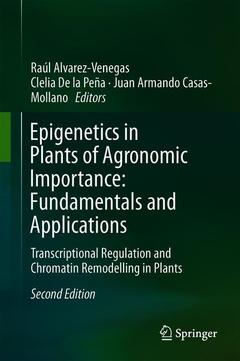Epigenetics in Plants of Agronomic Importance: Fundamentals and Applications (2nd Ed., 2nd ed. 2019) Transcriptional Regulation and Chromatin Remodelling in Plants
Coordonnateurs : Alvarez-Venegas Raúl, De-la-Peña Clelia, Casas-Mollano Juan Armando

Over the past few decades, chromatin modulation has emerged as an important regulator of gene expression. This second edition provides detailed information on the epigenetic mechanisms in plants, illustrating the value of this research in plants of agronomic importance. It examines recent advances regarding plants? epigenetic regulation in response to abiotic and biotic types of stress; the epigenetic basis of plant immunity; evolution and functions of plant histones; epigenetic variation and plant breeding; and epigenome editing and crop improvement. The content is intended to promote the development of future biotechnologies to manipulate and selectively activate/inhibit proteins and metabolic pathways to counter pathogens, to treat important diseases, and to increase crop productivity. The development of new fields, like epigenome editing and RNA epigenetics, will certainly improve our understanding of currently known epigenetic modifications and their roles in e.g. host-pathogeninteractions, crop productivity, and in response to environmental stimuli. This volume contains twelve new/revised chapters, written by an international team of experts on plant epigenetics, and addresses the needs of researchers and professionals in the fields of agronomics, crop breeding, epigenetics, plant biochemistry, plant developmental biology, and related disciplines.
Dr. Raúl Alvarez-Venegas obtained his PhD in Biochemistry and Molecular Biology from Purdue University (USA) in 2002, where he investigated the epigenetic mechanisms of gene regulation in plants. He subsequently worked as a postdoctoral researcher and as a Research Assistant Professor at the University of Nebraska-Lincoln (USA) from 2002 to 2005. In 2006 he moved to Canada to work as a postdoctoral researcher at Pioneer Hi-Bred, where he began working on virus-induced gene silencing in canola. He was appointed a Research Professor at CINVESTAV in 2007, where he continued to investigate the epigenetic mechanisms of gene regulation in plants and plant-pathogen interactions. Since 2008 he has been recognized as a National Researcher in Mexico. His current research areas include: the study of epigenetic mechanisms involved in defense-priming, epigenetics in crop biotechnology, epigenome editing in crops, and plant-pathogen interactions.
Dr. Clelia De-la-Peña holds a Bachelor’s degree in Biochemistry Engineering from the Instituto Tecnológico de Mérida (ITM) and a Master’s degree in Plant Science and Biotechnology from the Centro de Investigación Científica de Yucatán (CICY). In 2007 she completed her PhD at Colorado State University (CSU), USA. She pursued postdoctoral work at CSU in 2008 and at the Department of Genetic Engineering, Center for Research and Advanced Studies (Cinvestav-Irapuato, Mexico), in 2009. Dr. De-la-Peña is currently a Professor at the Department of Biotechnology, CICY. She received the UNESCO-L´oréal Fellowship for Young Women in Life Science in 2010; the ITM’s “Ingeniera Distinguida” Award in 2011 and a Cátedra Marcos Moshinsky Fellowship in 2017.
Dr. Juan Armando Casas Mollano is an Assistant Professor at the School of Biological Sciences and Engineering of Yachay Tech University. He completed his PhD at the Department of Genetics, University of Dublin in 2004. He then worked as a postdoctoral researcher and later as a Rese
Date de parution : 05-2019
Ouvrage de 415 p.
15.5x23.5 cm



